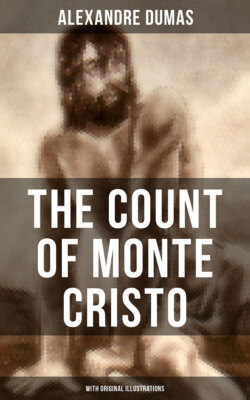Читать книгу The Count of Monte Cristo (With Original Illustrations) - Alexandre Dumas - Страница 126
На сайте Литреса книга снята с продажи.
Chapter 29. The House of Morrel & Son.
ОглавлениеTable of Contents
Any one who had quitted Marseilles a few years previously, well acquainted with the interior of Morrel's warehouse, and had returned at this date, would have found a great change. Instead of that air of life, of comfort, and of happiness that permeates a flourishing and prosperous business establishment—instead of merry faces at the windows, busy clerks hurrying to and fro in the long corridors—instead of the court filled with bales of goods, re-echoing with the cries and the jokes of porters, one would have immediately perceived all aspect of sadness and gloom. Out of all the numerous clerks that used to fill the deserted corridor and the empty office, but two remained. One was a young man of three or four and twenty, who was in love with M. Morrel's daughter, and had remained with him in spite of the efforts of his friends to induce him to withdraw; the other was an old one-eyed cashier, called "Cocles," or "Cock-eye," a nickname given him by the young men who used to throng this vast now almost deserted bee-hive, and which had so completely replaced his real name that he would not, in all probability, have replied to any one who addressed him by it.
Cocles remained in M. Morrel's service, and a most singular change had taken place in his position; he had at the same time risen to the rank of cashier, and sunk to the rank of a servant. He was, however, the same Cocles, good, patient, devoted, but inflexible on the subject of arithmetic, the only point on which he would have stood firm against the world, even against M. Morrel; and strong in the multiplication-table, which he had at his fingers' ends, no matter what scheme or what trap was laid to catch him. In the midst of the disasters that befell the house, Cocles was the only one unmoved. But this did not arise from a want of affection; on the contrary, from a firm conviction. Like the rats that one by one forsake the doomed ship even before the vessel weighs anchor, so all the numerous clerks had by degrees deserted the office and the warehouse. Cocles had seen them go without thinking of inquiring the cause of their departure. Everything was as we have said, a question of arithmetic to Cocles, and during twenty years he had always seen all payments made with such exactitude, that it seemed as impossible to him that the house should stop payment, as it would to a miller that the river that had so long turned his mill should cease to flow.
Nothing had as yet occurred to shake Cocles' belief; the last month's payment had been made with the most scrupulous exactitude; Cocles had detected an overbalance of fourteen sous in his cash, and the same evening he had brought them to M. Morrel, who, with a melancholy smile, threw them into an almost empty drawer, saying:—
"Thanks, Cocles; you are the pearl of cashiers."
Cocles went away perfectly happy, for this eulogium of M. Morrel, himself the pearl of the honest men of Marseilles, flattered him more than a present of fifty crowns. But since the end of the month M. Morrel had passed many an anxious hour. In order to meet the payments then due; he had collected all his resources, and, fearing lest the report of his distress should get bruited abroad at Marseilles when he was known to be reduced to such an extremity, he went to the Beaucaire fair to sell his wife's and daughter's jewels and a portion of his plate. By this means the end of the month was passed, but his resources were now exhausted. Credit, owing to the reports afloat, was no longer to be had; and to meet the one hundred thousand francs due on the 10th of the present month, and the one hundred thousand francs due on the 15th of the next month to M. de Boville, M. Morrel had, in reality, no hope but the return of the Pharaon, of whose departure he had learnt from a vessel which had weighed anchor at the same time, and which had already arrived in harbor. But this vessel which, like the Pharaon, came from Calcutta, had been in for a fortnight, while no intelligence had been received of the Pharaon.
